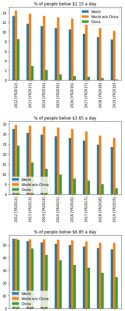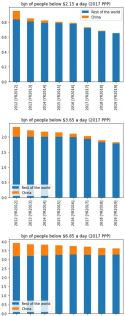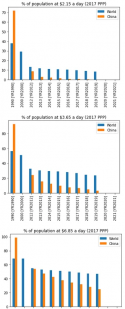You are using an out of date browser. It may not display this or other websites correctly.
You should upgrade or use an alternative browser.
You should upgrade or use an alternative browser.
Chinese Economics Thread
- Thread starter Norfolk
- Start date
DUISBURG, Germany -- Suad Durakovic, the owner of a truck driving school on the outskirts of the western German city of Duisburg, made it into Chinese newspapers in 2019 by testifying that Beijing's Belt and Road Initiative had triggered a local logistics industry boom.
Today, his business benefits from a shortage of qualified truckers, but not because of China's global infrastructure development strategy.
"The Silk Road has not developed for us," Durakovic told Nikkei Asia. "First it was COVID, then it was the Ukraine war, so the boom is no longer about Silk Road logistics."
Duisburg, a city of half a million people, is located in Germany's industrial heartland at the junction of the Rhine and Ruhr rivers. A downturn in the country's steel and coal industries in the 1990s and early 2000s battered its economy.
But the city found a savior in Chinese President Xi Jinping, who visited Duisburg in 2014 to officially make its inland port Europe's main Belt and Road hub. While this fueled anticipation of a new heyday, recent events suggest the prospects are dimming.

Much of this stems from the Ukraine war and Germany's awkward relationship with China.
Chancellor Olaf Scholz was the first European leader to visit Beijing since Xi secured a third term as party leader at the Communist Party Congress in October. But German attitudes have soured recently over China's cozy relationship with Russia, Taiwan and human rights, as well as its growing trade deficit with the world's second-biggest economy.
Germany is currently reviewing its relationship with Beijing, with the unveiling of Berlin's
Draft excerpts show lawmakers urging a significantly toughened stance and a reduction of economic reliance on China. The more drastic prescriptions include limiting investment in China and stricter monitoring of companies overdependent on China for business.
German Chancellor Olaf Scholz meets with Chinese President Xi Jinping at the Great Hall of the People in Beijing on Nov. 4, 2022. © AP
Plans were buried in 2021 for a sprawling China business center on the banks of the Rhine, from where hundreds of Chinese companies were meant to grow their European distribution networks.
In November, Duisburg cited China's ties with Russia as a reason for letting expire a memorandum of understanding for a sweeping "smart city" project with Chinese tech giant Huawei.
Russia's sudden reduction of natural gas exports to Germany fueled a notion among German policymakers that it was not a good idea to let critical infrastructure fall into the wrong hands.
Around the same time, it became known that Chinese state-owned Cosco Shipping Holdings had in June quietly returned a 30% stake in a 100 million euro ($108 million) Duisburg port terminal project.
"As state-owned Cosco pulls out, other privately-owned Chinese logistics players stay engaged, which suggests that Cosco pulled out of the port terminal project over political headwinds," said Markus Taube, the University Duisburg-Essen's professor for East Asia economics and China. "That event and the expired Huawei deal nurture doubts among Duisburg's Chinese business community whether Duisburg still is a good place for them to do business."

The mood has certainly changed since 2011, when the first train on the China Railway Express -- an alternative to container shipping -- arrived in Duisburg and opened a new chapter in China-Europe land transportation.
The line constituted a key part of China's efforts to entice electronics-makers to move their manufacturing away from China's coastal provinces to the Chinese inland, where cities are served by the new train services.
Data by Duisport, the port's owner and operator, show that pandemic-related disruptions to maritime trade boosted the Silk Road freight rail business, with the geopolitical upheaval stemming with the Ukraine war causing the opposite.
While the annual number of trains rose by 12% to 2,800 in 2021, bookings dropped by about 30% in the spring of 2022, as businesses that adopted rail freight faced reputational, insurance, sanction and confiscation risks along the Russian route.
In late 2022, a port spokesman told Nikkei Asia that although momentum has since improved, figures remain below pre-pandemic days -- the share of the China-Europe freight rail business in the port's overall turnover is now 3-4%.
Duisburg is home to Europe’s largest inland port. (Photo by Jens Kastner)
Nanjing High Accurate Drive Equipment Manufacturing Group (NGC) in 2015 opened its European headquarters in the city for design, testing, maintenance, and refurbishment of gearboxes for wind turbines and industrial equipment. The company cited direct train services between Duisburg and its headquarters in Nanjing as one of the main factors for choosing the city.
But one complaint among opposition Duisburg council members is that Chinese companies are not contributing to the local economy.
Nikkei Asia's research of local trade registers suggests that nearly all of the 100 or so Chinese companies that opened brick-and-mortar presences in Duisburg are engaged in either logistics or cross-border e-commerce. For example, a company with the Germanic-sounding name Hermann Commerce distributes Chinese instant food, soy sauce and food seasonings to more than 20 European countries.
Chinese-owned Lisstec markets a cosmetics brand with the similarly Germanic-sounding name Hermuna, which is pitched as "Made in Germany." But the brand only appears to be available for consumers in China despite the company's Chinese-language Weibo social media account suggesting its products are made in a German factory for sale in German cosmetics stores and pharmacy chain stores.
"The Chinese e-commerce companies that have set up here are not known to be big local job creators or tax contributors," said Sven Benentreu, the deputy chairman of the local chapter of the pro-business Free Democratic Party (FDP), an opposition party in Duisburg.
"We as the FDP appreciate the presence of Chinese companies here, but the strong China focus of the city government is obviously not paying off as expected," he added.
NGC and the other Chinese-owned companies approached by Nikkei Asia for this article either declined to be interviewed or did not return phone calls.
Kai Yu, director of the China Business Network Duisburg, also declined to be interviewed, just saying in November that "the Chinese managers I know are unavailable, because they have already traveled back to China for the Chinese New Year holiday."
China is currently celebrating the lunar new year, two months after Nikkei Asia approached Yu.

Chinese students in Duisburg are also not integrating into the city, local academics say.
About 2,000 Chinese nationals are enrolled at University Duisburg-Essen, the largest intake among German universities, due mainly to a city partnership signed between Duisburg and Wuhan in 1982 that encouraged academic exchanges.
Duisburg's Chinese student population is concentrated in the streets near the university, where there are a handful of Chinese restaurants and shops. Several part-time student restaurant workers said they mainly came from Shandong province under academic exchange arrangements.
"It has always struck me how isolated Duisburg's Chinese student population is compared to those of other Asian countries, with Chinese community groups effectively shielding new arrivals by assisting in all the initial tasks such as arrangement of accommodation," said Antonia Hmaidi, an analyst at the China think tank Merics in Berlin, who previously taught at University Duisburg-Essen.
"China's deteriorating image as an autocratic rival also made China-centered career planning unpopular among German students," she added. "The relationship with China has become more politicized than a few years ago."
"After the German government releases its new China strategy, the overall climate will probably further worsen, which will probably further cool Duisburg's business relationship with China."
Too long. Just glossed over. But these paragraphs got my attention and showed how stupid and hypocritical the article is.
Chinese students in Duisburg are also not integrating into the city, local academics say.
About 2,000 Chinese nationals are enrolled at University Duisburg-Essen, the largest intake among German universities, due mainly to a city partnership signed between Duisburg and Wuhan in 1982 that encouraged academic exchanges.
Duisburg's Chinese student population is concentrated in the streets near the university, where there are a handful of Chinese restaurants and shops. Several part-time student restaurant workers said they mainly came from Shandong province under academic exchange arrangements.
"It has always struck me how isolated Duisburg's Chinese student population is compared to those of other Asian countries, with Chinese community groups effectively shielding new arrivals by assisting in all the initial tasks such as arrangement of accommodation," said Antonia Hmaidi, an analyst at the China think tank Merics in Berlin, who previously taught at University Duisburg-Essen.
The Chinese students are not immigrants. Integrating into the city is not what foreign students expect to do. It is just logical and sensible for them to stay near their university campus, you know, for ease of commute.
Staying together with their own folks is for safety and convenience. The Chinese students are supporting each other in cold (aka 抱团取暖 in Chinese saying). So it was the locals of Duisburg that should have reflected whether they have provided enough support and kindness to these young coming from China.
What would the author and Mr Hmaidi think of the "German towns" and "German districts" in North America? Are these German emigrants "isolated" and "not integrating into the city"?
And assisting new comers to settle down has become a sin in Germany?
You didn't miss much, just Europeons speedrunning deindustrialization and poverty.Too long. Just glossed over.
Sollen die verrecken und an ihrer Armut ersticken, Duisburg letztes Drecksloch im Ruhrpott, Hauptbahnhof sieht immer noch aus wie ein Bordell für Aids-Kranke.
escobar
Brigadier
China’s “Small is Beautiful” shift favors smaller projects, both in financial value and geographic size. The 1st 5 years of BRI (2013-2017) brought larger projects, but recent projects have returned to more targeted support.
我国有超3万亿美元外汇,假如美方冻结我国外汇,我们该怎么办?
众所周知,去年受美元汇率波动的影响,世界各国一直都在不断抛售自己手上的美债。我国也不例外,并且抛售的总量最多。但即便抛售了大量美债,我们手上还有超过3万亿美元左右的美债。
考虑到当下我们与美方之间的关系比较微妙,万一闹僵,美方撕破脸直接冻结了我国的外汇资金,到时候如何是好呢?现在网上有人讨论,我国有超3万亿美元外汇,若美方冻结我国外汇,我们该怎么办?下面,我们就一起来看看内行人怎么说吧。
一、为什么要大量抛售美债
在过去的很长一段时间里,世界各国对于美债的购买都是非常热衷的。大家之所以要大量购买美债,主要是出于对美元和美方经济发展的信任。只要美方经济蓬勃发展,拥有大量美债的国家,就能从中获得相应的好处。
但当下的情况却不一样,考虑到美方的经济问题比较严重,如果我们继续持有大量的美债,那么就要与美方共同承担当下所面临的经济风险。首先第1个风险就是可能出现的资产大面积缩水,毕竟美方此前的种种做法,很难不让人怀疑他们的最终目的不是降低外债实际价值。
美联储的超发货币行为,不仅仅可以暂时解决本国的经济发展困境,同时还可以让美元贬值。一旦美元贬值,美方所面临的实际外债价值就会出现大幅度的降低。到时候,美方就能从中获利。有一方获利,就代表着有一方要遭受利益的损失。
很显然,一旦美方获利,其他国家就会遭受相应的损失。既然美方的目的都已经这么明确了,我们大量保有美债,岂不就是在等着美方来收割财富吗?因此,不少国家都陆续开始抛售美债。其中抛售的最多的,就是我国和日方。
第2个风险就是可能会给我国带来严重的通货膨胀,在过去的一年当中,美方的通货膨胀问题还是非常严重的。虽然我国有央行调控,但还是不可避免的遭到了输入型通货膨胀的影响。至于其他西方国家,通胀情况就更加不乐观了。相比较之下,我们当下所面临的通胀冲击,几乎已经小到可以忽略不计。
第3个风险就是违约风险,在这场危机之后,美方也在积极采取措施救市救民生,这势必会产生大量的经济支出。从而增加美方的债务。债务不断增加,还不起债的风险就会越来越大。美债的信用,也在美方的一系列操作下不断降低。
二、美方冻结我国外汇资产后应该怎么办
不可否认的是,按照当下的发展形势来看,我国所持有的美债数量还是相对比较可观的,美方很有可能会冻结我国的外汇资产。一旦被冻结,我们就要遭受较大的经济损失。因此,当下最重要的事情就是继续抛售美债。
只有不断减持手中的美债,才能尽可能避免经济利益的损失。虽然我们可能会失去一些盈利,但与此同时也会将我们面临的风险降到最低。根据内行人的分析来看,相比较于大量持有美债,倒不如增加外汇储备的多元化,同时也是在分摊外汇风险。
在多元化的过程中,我们可以考虑IMF证券,也可以考虑欧元证券。除了这些老牌资本主义国家和重点国际组织之外,我们还可以考虑一些发展前景不错的新兴国家债务。就比如说现在的很多欧洲国家,都在考虑我国债券。
不管做什么,我们都不能将全部的希望集中在一样东西身上。就如同鸡蛋不能全部放在一个篮子里一样,适当的分摊风险,才能将我们可能的损失降到最低。当下我们持有3万亿美元的美债,确实是一件比较冒险的事情。另外就是尽可能将美联储地下银行当中的黄金取回,如果实在不能取回,接下来也不要再盲目增加黄金的总量。
虽然美方是世界大国,可能会考虑面子方面的问题。但一旦两国的矛盾激化,面子可就没有那么重要了。最后就是要增加战略能源储备,保障好本国的粮食安全。过去的一年当中,国际社会确实产生了较大的波动。在2023年,我们也不能保障国际社会的稳定。只有做好充足的保障,才能更好的应对未知的未来。
总的来看,虽然经历了几轮抛售,但我国现有的美债数量还是相对偏多。接下来我们还应继续抛售美债,将可能的风险降到最低。另外,为避免外汇被冻结,我们也要尽可能发展外汇储备的多元化,增加我国外汇的抗风险能力
Good points here about China's holding of US debts. They still have just too much of it. A country as large as China unfortunately do need to hold some US assets to be able to defend its currencies, but $3 trillion is just too much (probably $1 trillion in treasuries and remaining $2 trillion in other bonds). If the Russian sanctions have taught them anything, it would be that American can confiscate that money at any time. Keep buying gold and other tangible assets. That's the only way to go.
This guy spent all last year claiming that Ukraine had permanently changed the calculus on China, and investors were never going to invest in China ever again.Foreign investment is rushing into China again.
Those yellow inflows were supposed to turn into large, never-ending negative outflows.
Looks like China failed to collapse, yet again.
https://www.reddit.com/r/Sino/comments/10j7dhw



One of the comments: "What happened that caused the massive drop in poverty in 2013?"
Other commenter: "Xi Jinping happened."



One of the comments: "What happened that caused the massive drop in poverty in 2013?"
Other commenter: "Xi Jinping happened."
